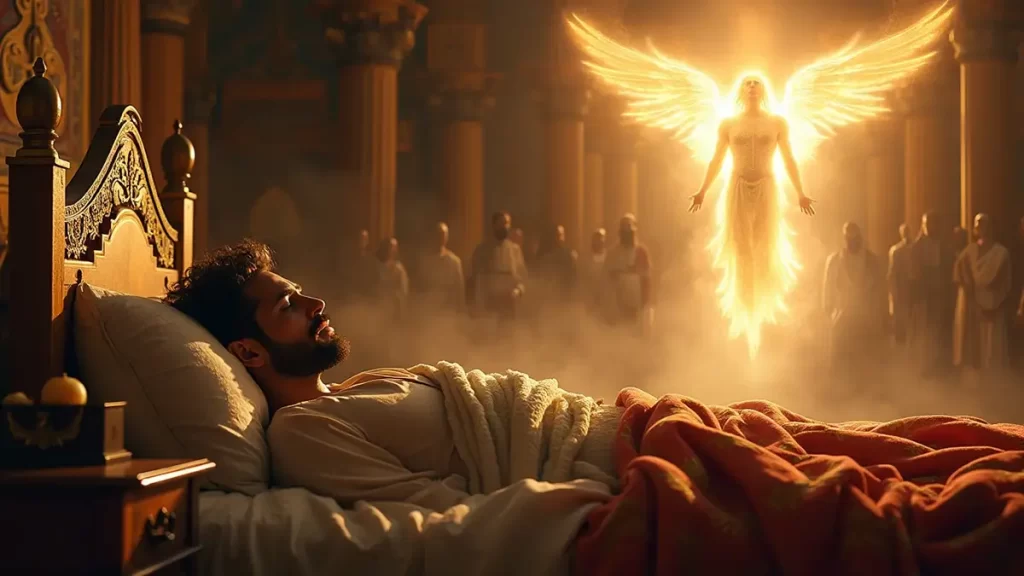Introduction to Abimelech’s Dream
Imagine being warned in your sleep, a voice so clear it’s like thunder in your head. That’s exactly what happened to Abimelech, a king who thought he was doing the right thing by taking a beautiful woman named Sarah into his home.
Little did he know, Sarah was already married to Abraham, and taking her was about to stir up trouble with a higher power.
One night, while Abimelech was fast asleep, God sent him a dream, a dream that would stop him in his tracks.
In this dream, God told Abimelech not to touch Sarah, for she was already a man’s wife. Abimelech woke up with a start, his heart pounding like a drum.
He knew this was no ordinary dream—it was a warning, as clear as a bell, that he couldn’t ignore.

Navigate to What Matters
The Context: Who Was Abimelech?
Abimelech wasn’t just any man; he was a king, a ruler with power and authority. He lived during a time when leaders often took what they wanted, especially when it came to beautiful women.
So, when he saw Sarah, he assumed she was available, especially since Abraham had told everyone she was his sister.
But there was more to the story. Abimelech didn’t know that Abraham was trying to protect himself by hiding the truth.
Back then, saying your wife was your sister was like a safety net—Abraham thought it would keep them both safe from harm. But this little lie was about to cause a big problem.
In those days, dreams weren’t just random thoughts. They were seen as messages, sometimes from the gods, and people took them very seriously.
So, when Abimelech had his dream, he knew something was up. This wasn’t just about a misunderstanding—it was about something much bigger.
The Dream: A Divine Intervention
One night, as Abimelech lay asleep, his world changed in an instant. In his dream, he saw a figure, powerful and commanding, like a mighty king in a shining robe.
This figure spoke to him, but not with anger—instead, it was with a stern warning: “You’re a dead man because of the woman you’ve taken. She’s a married woman!”
Abimelech was shocked, his heart racing. He hadn’t known that Sarah was Abraham’s wife. In his dream, he pleaded his case, saying, “Lord, I didn’t know! I’m innocent! They told me she was his sister!” The figure replied, more calmly this time, “I know you didn’t know. That’s why I’m warning you now. Return the woman to her husband, or you’ll be punished.”
When Abimelech woke up, the dream was as clear as if it had happened in real life. The message was loud and clear: Sarah was off-limits, and keeping her would bring nothing but trouble.
It wasn’t just a dream; it was a direct message from God Himself, a warning wrapped in a night’s vision.
Religious Significance and Interpretations
In those days, people believed that dreams were more than just images in your mind—they were messages, signs from the divine. Abimelech’s dream wasn’t just any dream, it was a direct communication from God, showing His protective hand over Sarah and Abraham.
This dream showed God’s power and His care for His people. By warning Abimelech before he could make a grave mistake, God was protecting Sarah and keeping His promise to Abraham.
This wasn’t just about one man’s mistake; it was about a larger plan, one where God was watching over His chosen ones.
Religious scholars have long seen this dream as a sign of God’s mercy. Even though Abimelech was not part of Abraham’s people, God still reached out to him, guiding him to do the right thing.
It’s a reminder that God’s plans are bigger than we can see and that He can use dreams to guide and protect us, even when we least expect it.
The Aftermath: Abimelech’s Response
The morning after the dream, Abimelech wasted no time. He called his servants and told them everything.
Their fear was palpable, spreading through the household like wildfire. Abimelech knew he had to act fast—this wasn’t something to take lightly.
He returned Sarah to Abraham immediately, but not without asking a few questions. “Why did you do this to me?”
he asked Abraham. Abraham explained that he was afraid for his life, thinking that Abimelech might kill him to take Sarah if he knew she was his wife.
But the dream had changed everything. Abimelech not only returned Sarah, but he also gave Abraham sheep, cattle, and servants, as if to make amends. He even offered Abraham the choice of land to settle in, showing that the dream had struck deep into his heart.
This wasn’t just about avoiding punishment—it was about doing what was right in the eyes of God.
The Power of Dreams in Religious Contexts
This story of Abimelech’s dream isn’t just a tale from ancient times; it’s a powerful example of how dreams have been seen as messages from the divine across many cultures and religions. Whether it’s a warning, guidance, or a glimpse into the future, dreams like Abimelech’s have always held a special place in religious stories.
In many religious texts, dreams are where the divine meets the human, where God’s will is revealed in a way that’s personal and profound. Abimelech’s dream is just one of many examples where a simple night’s sleep brings a message that can change lives, steer decisions, and alter the course of history.
Conclusion
Abimelech’s dream was more than just a warning—it was a sign of God’s active presence and protection. It shows how dreams can be powerful tools, used by the divine to guide, warn, and protect those who are faithful.
This story reminds us that sometimes, the most important messages come when we’re least expecting them, in the quiet of the night, delivered in the language of dreams.

